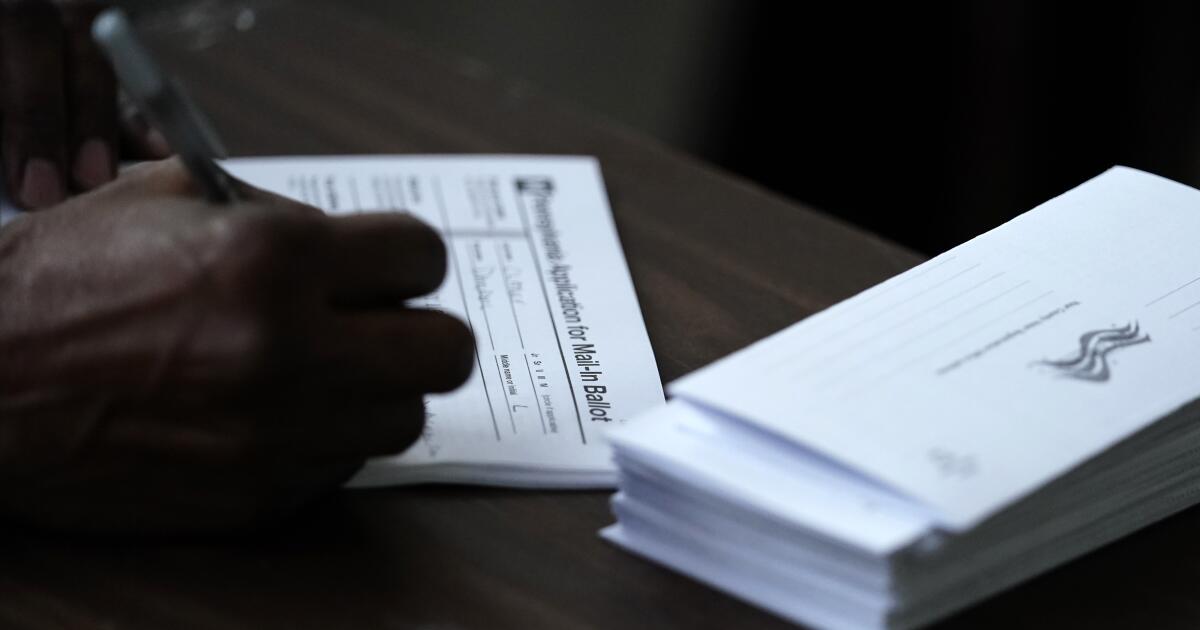Judge throws out Trump campaign’s Pennsylvania lawsuit
HARRISBURG, Pa. — A federal judge in Pennsylvania on Saturday threw out a lawsuit filed by President Trump’s campaign, dismissing its challenges to the battleground state’s poll-watching law and the campaign’s efforts to limit how mail-in ballots can be collected and which of them can be counted.
Elements of the ruling by U.S. District Judge J. Nicholas Ranjan could be appealed by Trump’s campaign, with just over three weeks to go until election day in a state hotly contested by Trump and Democratic presidential nominee Joe Biden.
The lawsuit was opposed by Democratic Gov. Tom Wolf’s administration, the state Democratic Party, the League of Women Voters, the NAACP’s Pennsylvania office and other allied groups.
“The court’s decision today affirms what we’ve long known, that Pennsylvania’s elections are safe, secure and accurate, and residents can vote on Nov. 3 with confidence that their votes will be counted and their voices heard,” Wolf’s office said in a statement.
“The ruling is a complete rejection of the continued misinformation about voter fraud and corruption and those who seek to sow chaos and discord ahead of the upcoming election,” the statement added.
However, Trump’s campaign indicated in a statement that it would appeal and looked forward to a quick decision “that will further protect Pennsylvania voters from the Democrats’ radical voting system.”
The lawsuit is one of many partisan battles being fought in the state Legislature and the courts over mail-in voting amid the prospect that a presidential election result could be delayed for days by a drawn-out vote count in Pennsylvania.
In this case, Trump’s campaign wanted the court to bar counties from collecting mail ballots using drop boxes or mobile sites that are not “staffed, secured and employed consistently within and across all 67 of Pennsylvania’s counties.”
More than 20 counties — including Philadelphia and most other heavily populated Democratic-leaning counties — have told the state elections office that they plan to use drop boxes and satellite election offices to help collect mail-in ballots.
Trump’s campaign also wanted the court to free county election officials to disqualify mail-in ballots where the voter’s signature may not match their signature on file and to remove a county residency requirement for poll watchers.
In guidance last month, Wolf’s top elections official told counties that state law does not require or permit them to reject a mail-in ballot solely over a perceived signature inconsistency.
The Trump campaign had asked Ranjan to declare that guidance unconstitutional and to block counties from following it.
In throwing out the case, Ranjan wrote that the Trump campaign could not prove its central claim that election fraud in Pennsylvania threatened to cost Trump the election and that adopting the changes the campaign sought would remove that threat.
“While plaintiffs may not need to prove actual voter fraud, they must at least prove that such fraud is ‘certainly impending,’” Ranjan wrote. “They haven’t met that burden. At most, they have pieced together a sequence of uncertain assumptions.”
Ranjan also cited decisions in recent days by the U.S. Supreme Court and the U.S. 11th Circuit Court of Appeals in hot-button election cases, saying he should not second-guess decisions by state lawmakers and election officials.
The decision comes as Trump claims he can’t lose the state unless Democrats cheat, and, as he did in the 2016 campaign, suggests that the Democratic bastion of Philadelphia needs to be watched closely for election fraud.
Democrats counter that Trump is running on a conspiracy theory of election fraud because he cannot win on his own record of fraud and mismanagement.
